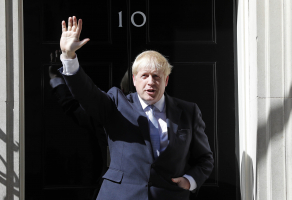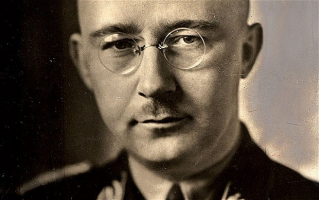Top 10 Interesting Facts about Boris Yeltsin
From 1991 to 1999, Boris Yeltsin served as president of Russia and was the country's first freely and democratically elected head of state. Finally, Yeltsin ... read more...was viewed as both a chaotic and inept drunkard who helped bring down the USSR quietly and usher Russia into a new era, as well as a mixed character in the international arena who was more frequently the target of derision than acclaim. Here are the ten most interesting facts about Boris Yeltsin you should not miss!
-
First of all, one of the most interesting facts about Boris Yeltsin is he was born to a peasant family. On February 1, 1931, Boris Yeltsin was born in the Russian Soviet Federative Socialist Republic, one of the Soviet Union's republics, in the village of Butka, Talitsky District, Sverdlovsk Oblast. His family had been residents of this region of the Urals since at least the seventeenth century, and they were of Russian descent. The fact that Boris Yeltsin came from a low-income household may be the least liked thing to know about him. In Butka village, he, his mother, and his siblings all resided. Klavdiya Vasilyevna Starygina was the bride of Nikolai Yeltsin, his father, in 1928.
Yeltsin always remained more attached to his mother than to his father, who frequently abused his wife and kids. His life was made considerably worse by the 1932–1933 famine, during which he had to get by on little to no food during his formative years. Yeltsin's grandpa Ignatii was accused of being a kulak (rich peasant) during Stalin's purges in 1931, the year before Yeltsin was born. He and his family were made to live in a cottage in the neighboring village of Butka when the family's lands were taken. Ignatii and his wife Anna were deported to Nadezhdinsk in 1934, where he died two years later. There, Nikolai and Ignatii's other children were permitted to join the local kolkhoz (community farm).
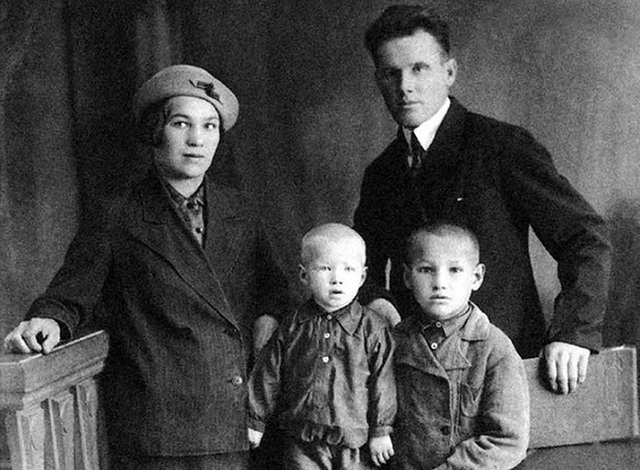
Photo: https://www.timetoast.com/ 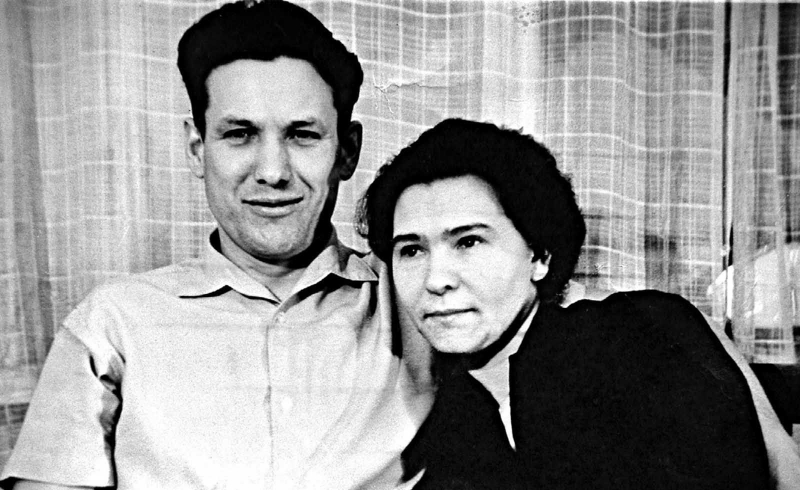
Photo: https://www.pinterest.jp/ -
Boris Yeltsin enrolled at Ural Polytechnic Institute in 1949, which is one of the most interesting facts about Boris Yeltsin. He then pursued training as an industrial and civil engineer, a profession that needed a deep understanding of mathematics, soil science, materials science, and physics. He had to study a foreign language in addition to this course, and he decided to learn German.
Although times were difficult, it was fortunate that tuition was free. Additionally, he received financial assistance to cover his expenses during this time. He supplemented his income after lessons by working sporadic jobs like unloading railway trucks.
Boris began working as a trainee with the Lower Iset Construction Directorate as soon as he finished his studies in 1955. He established his reputation and advanced through the ranks a few months later. Yeltsin was a superintendent by 1957, and three years later he was the section's chief engineer.
Boris Yeltsin was a well-liked personality inside the organization for the duration of his building career, which lasted until 1985. He continued to advance in this manner, and by 1975 he was the secretary of the committee in charge of the industrial growth of the area.
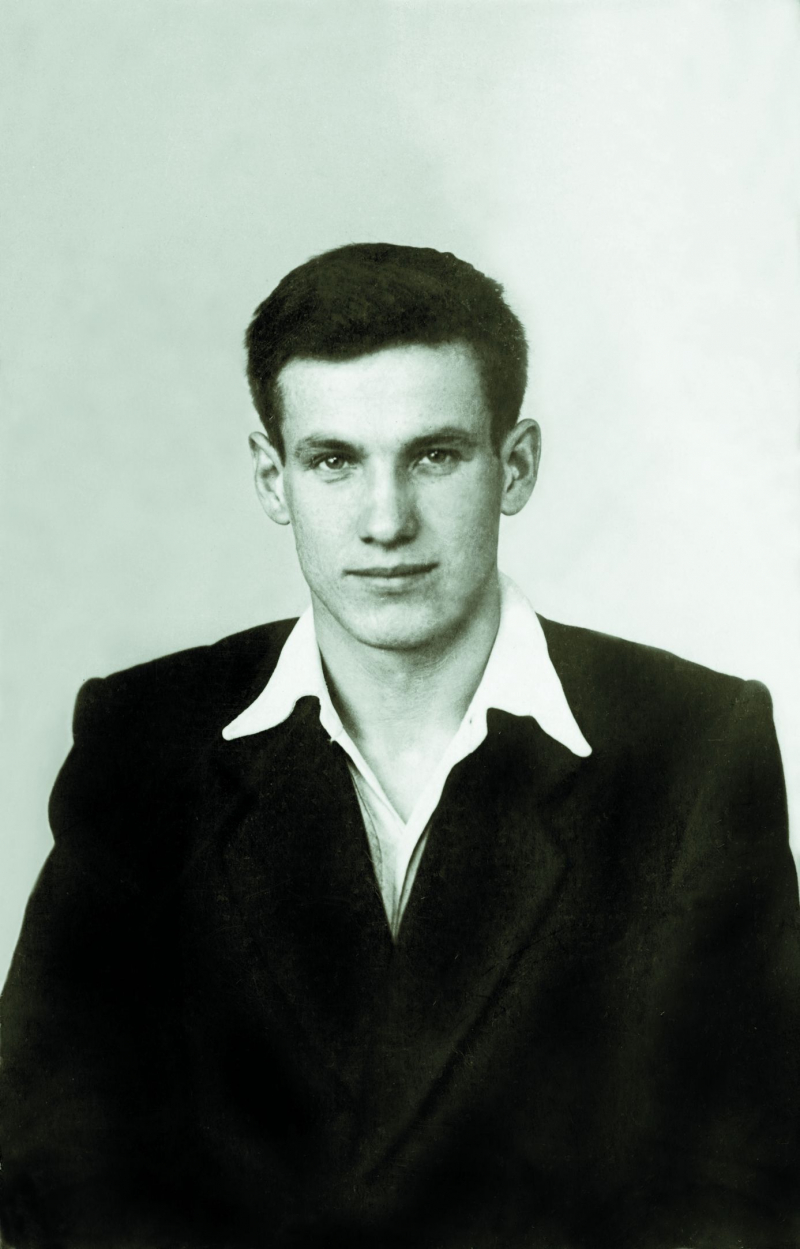
Photo: https://www.pinterest.com/ 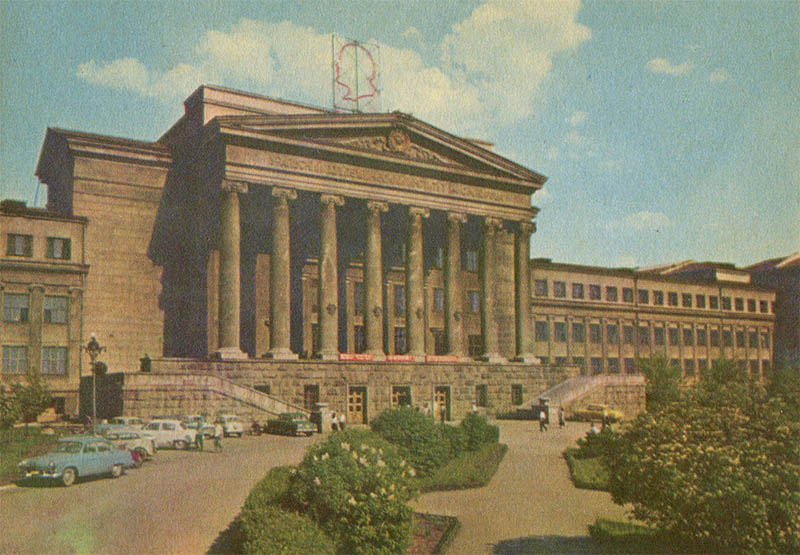
Photo: https://oldpostcards.biz/ -
In 1961, he joined the Communist Party. He started working for the party full-time in 1968, and in 1976 he was appointed the first secretary of the Sverdlovsk oblast party committee. After that, he met Mikhail Gorbachev, who was at that time his rival in the city of Stavropol. Yeltsin was appointed to the Politburo (as a nonvoting member) in 1986 by Gorbachev, who had chosen him in 1985 to purge the Moscow party organization of corruption after assuming power.
Yeltsin demonstrated to be a capable and tenacious reformer while serving as the mayor of Moscow (i.e., the first secretary of the Moscow Communist Party committee), but he alienated Gorbachev when he started to criticize the slow pace of reform at party gatherings, challenged party conservatives, and even criticize Gorbachev himself. Yeltsin was compelled to retire in disgrace from the Politburo in 1988 and the Moscow party leadership in 1987.
He became the first member of Gorbachev's party committee to ever resign. As a result, he garnered anti-establishment support and a reputation as a rebel. In 1990, he was chosen to lead the Russian Supreme Soviet as he advanced in politics.
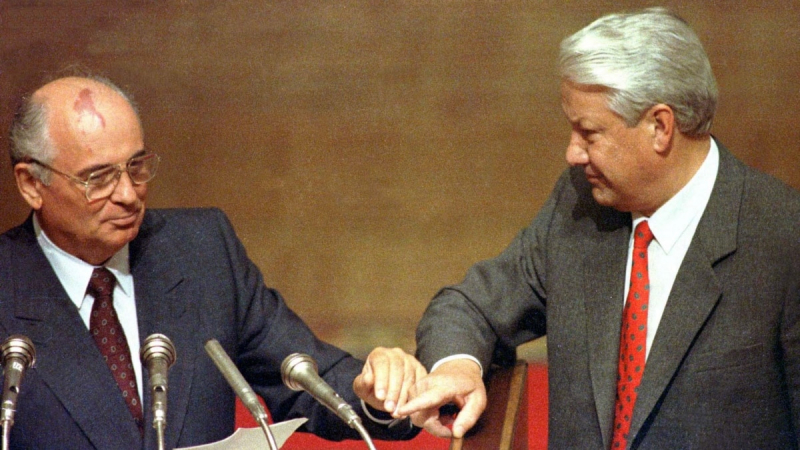
Photo: https://www.rferl.org/ 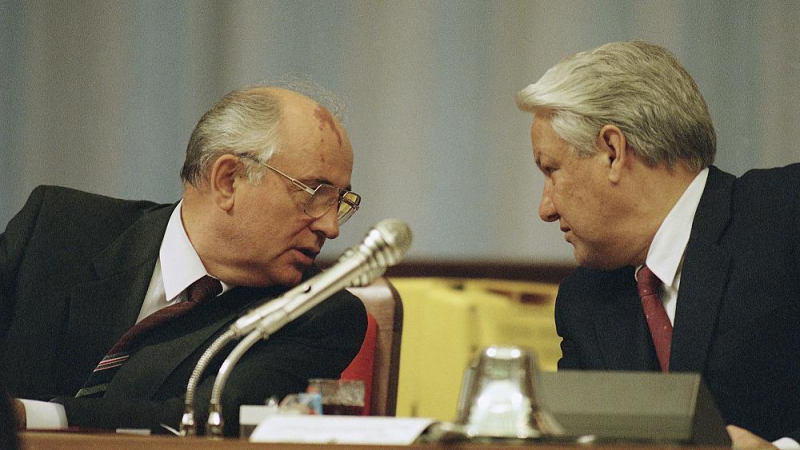
Photo: https://www.euronews.com/ -
Yeltsin underwent a demotion to the position of deputy minister for construction before mounting the most amazing comeback in Soviet history. His standing as a supporter of democratic and economic reform among Soviet voters had endured his downfall. By utilizing this to his advantage, he won over more Soviet votes. In March 1989, he used the competitive elections Gorbachev instituted for the USSR Congress of People's Deputies (the new Soviet parliament) to his advantage and won a seat there with a resounding victory from the Moscow constituency. This achievement was merely the start of what would happen later in his political career.
In defiance of Gorbachev, the Russian S.F.S.R. parliament elected him president of the Russian republic on May 29, 1990. In his new position, Yeltsin made moves to grant the Russian republic more autonomy, openly backed the right of Soviet republics to more autonomy inside the Soviet Union, and endorsed a market-oriented economy and a multiparty political system.
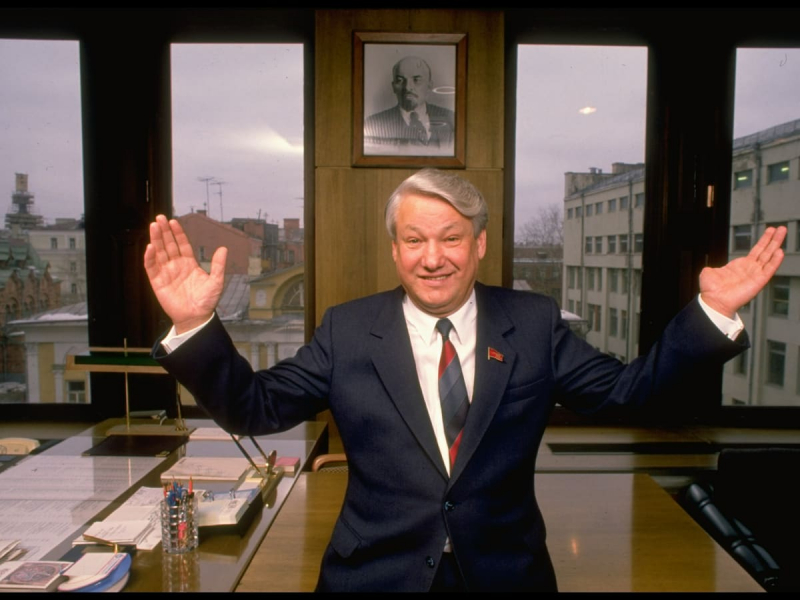
Photo: https://www.history.com/ 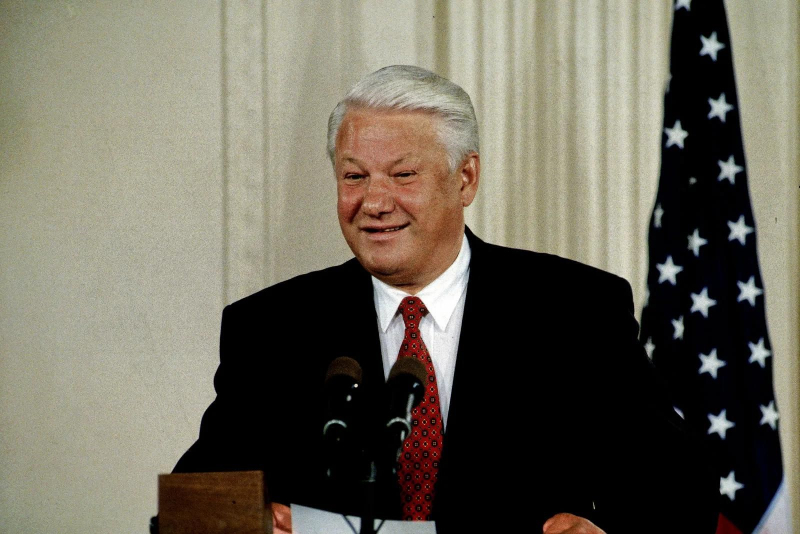
Photo: https://www.britannica.com/ -
In 1991, the Russian Federation was established and declared a nation following the fall of the Soviet Union. A democratic republic, the Russian Federation was governed by its constitution, which gained more force after 1993. Since then, there have been four presidents, the first of them was Boris Yeltsin, which is a crucial piece of information about him.
On June 12th, 1991, Boris was sworn in as president with a 57 percent approval rating. His victory in the country's first direct popular vote for president was viewed as a green light for economic change. Yeltsin opposed the coup leaders and mobilized opposition in Moscow during the brief communist takeover of Gorbachev in August 1991. He also called for Gorbachev's restoration. Yeltsin became the most influential political figure in the nation after the coup failed a few days after it started. Together with the leaders of Ukraine and Belarus (Belorussia), he founded the new Commonwealth of Independent States in December 1991 to take the place of the collapsing USSR. Following Gorbachev's departure as president of the Soviet Union on December 25, the Russian government, led by Yeltsin, took over many of the former superpower's duties for military, foreign policy, and finance.
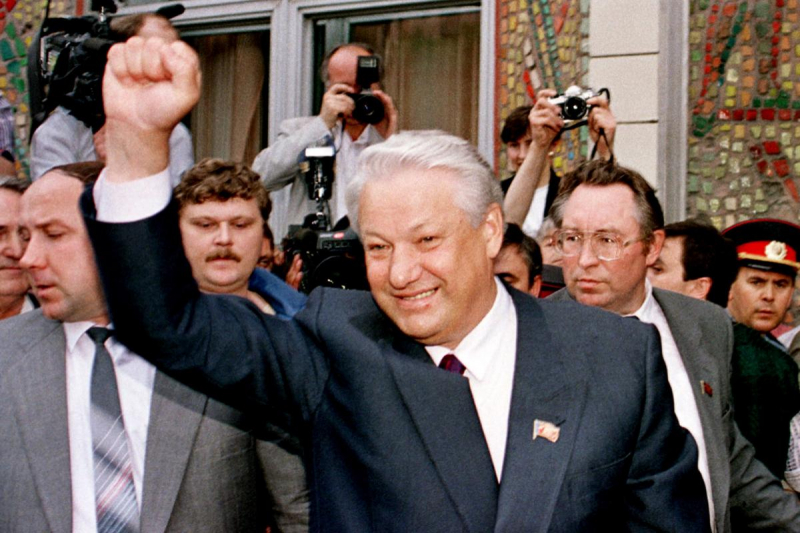
Photo: https://www.foreignaffairs.com/ 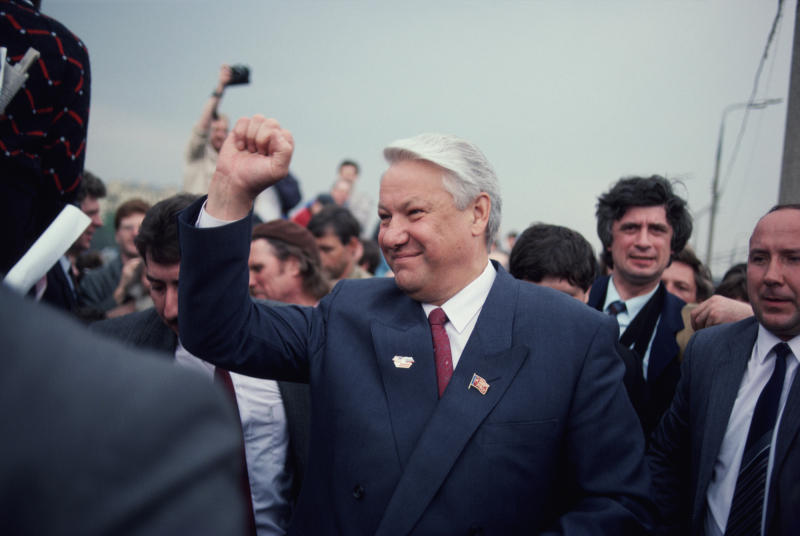
Photo: https://www.bloomberg.com/ -
Boris Yeltsin is the first person who springs to mind when the term "shock therapy" is uttered. The word often alludes to a dramatic adjustment to the nation's economic institutions in the pursuit of betterment.
Yeltsin undertook the difficult task of replacing his nation's ailing command economy with one based on free markets and private enterprise as president of an independent Russia. Early in 1992, he eliminated government price subsidies and restraints on food and other consumer items while enabling free markets to expand unrestrictedly in urban areas. At the same time, the Congress of People's Deputies in Russia had become more antagonistic toward his free-market reforms. The price hyperinflation and widening wealth disparity were the drawbacks, though. The issue of the balance of powers in the proposed new Russian constitution, which was required to replace the outmoded Russian Constitution from the Soviet era of 1978, also caused fierce disagreements between Yeltsin and Congress.
Yeltsin called for fresh parliamentary elections on September 21, 1993, after unlawfully dissolving Congress. Early in October, in reaction, hard-line lawmakers attempted a coup, but they were put down by Yeltsin-aligned army personnel. In December, a referendum on a proposed constitution as well as elections for the legislature was held. Although Yeltsin's proposed constitution, which strengthened the president's authority, narrowly passed, the Federal Assembly, Russia's newly elected parliament, has an anti-reform stance, forcing Yeltsin to rule mostly by executive order in the years to come.
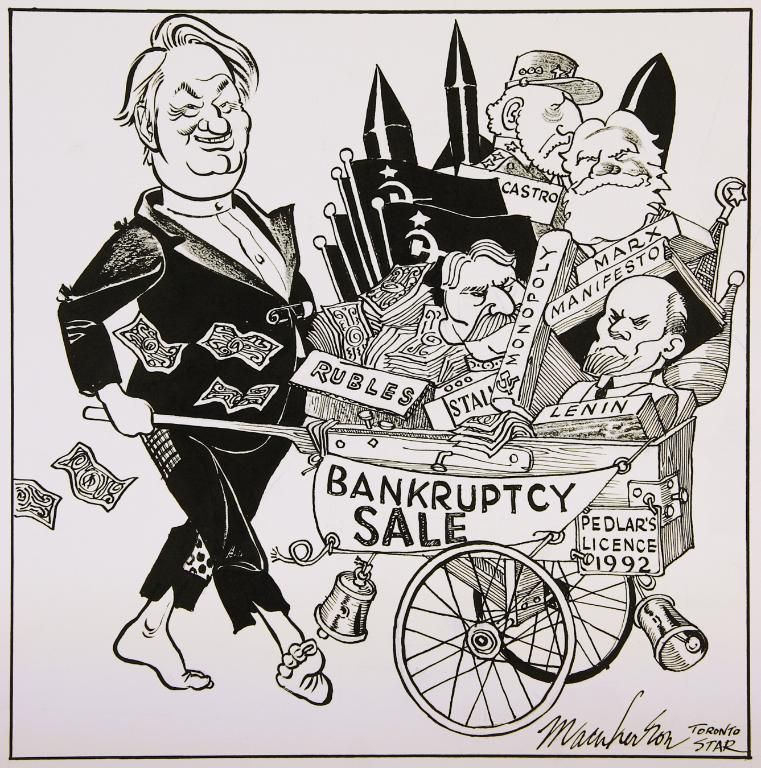
Photo: https://collections.musee-mccord-stewart.ca/ 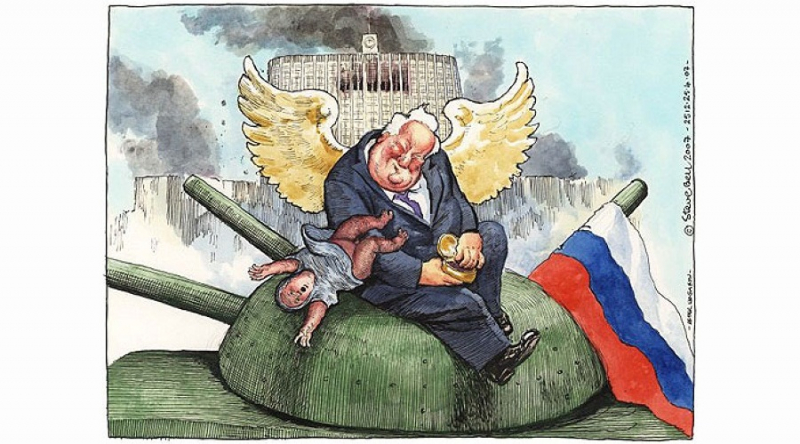
Photo: https://mayday.leftword.com/ -
The part Yeltsin played in the invasion of Chechnya, a former Soviet republic, was another key aspect of his time in office. Chechnya's secession raised President Yeltsin's concern that it would spark several independence movements within the Russian Republic. Additionally, he hoped to find the region's hidden lucrative oil reserves.
As a result, he gave the order for the Russian troops to invade, which resulted in one of the highest death tolls in the nation. The ferocious opposition the Russian troops encountered at Grozny caused thousands of them to perish. Numerous Chechen civilians perished throughout the two-year conflict, adding to the list of casualties.
However, the army was unable to subdue the insurgents, and the conflict significantly diminished Yeltsin's already dwindling support. Alexander Lebed, Yeltsin's then-security head, mediated a 1996 peace accord that saw Yeltsin withdraw federal forces from the devastated Chechnya. Chechnya was given more autonomy as part of the peace agreement, but not full independence. Many people in the West were horrified by the decision to start the war in Chechnya.
Then, what was to be made of Boris Yeltsin, asked Time magazine? It was obvious that he could no longer be considered the democratic hero of Western legend. But had he evolved into an old-style communist leader, abandoning the democratic reformers he had previously stood up for in favor of militarists and ultranationalists? Or was he a confused, out-of-touch chief who was being duped, wilfully or otherwise, by—well, by whom exactly? Would Yeltsin be its leader or victim if there were to be a totalitarian coup?
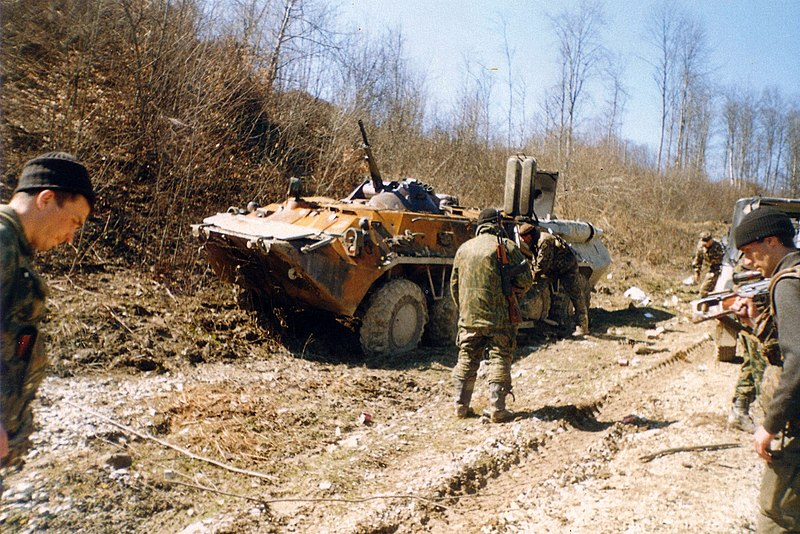
Photo: https://en.wikipedia.org/ 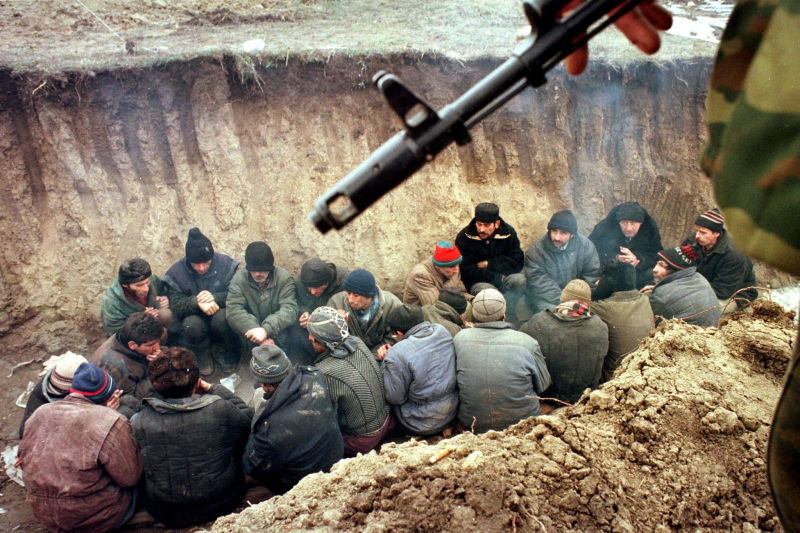
Photo: https://www.thetimes.co.uk/ -
Yeltsin's chances of winning reelection to the Russian presidency were diminished by the Chechnya conflict and the ineffectiveness of his free-market policies to promote economic expansion. But in a further stunning comeback, he defeated a communist rival to win reelection in the second round of elections held in July 1996, one of the most interesting facts about Boris Yeltsin. After winning the election, he spent several months recovering from a heart attack he had in June due to the stress of the campaign. Yeltsin's physical condition was a recurrent concern.
Yeltsin struck a cease-fire agreement with Chechnya early in his second term and worked to negotiate a peace treaty in 1997, but tensions persisted. Islamic insurgents from Chechnya attacked Dagestan in August 1999, and the Chechens were accused of carrying out several attacks throughout Russia the following month. Yeltsin promptly gave the order for the republic to receive its forces back. Political scheming predominated much of the late 1990s government as Yeltsin removed four premiers and his entire cabinet in 1998, though many were eventually reinstated.
The State Duma began an impeachment campaign against Yeltsin the next year, alleging, among other things, that he had fostered the dissolution of the Soviet Union in 1991. However, the Duma was unable to obtain the required number of votes to move further. Yeltsin, who is notorious for being unexpected, announced his resignation on December 31, 1999, in favor of what he called a new, dynamic leadership. Yeltsin appointed Vladimir Putin, the prime minister, as acting president. In return, Putin granted Yeltsin immunity from further legal action.
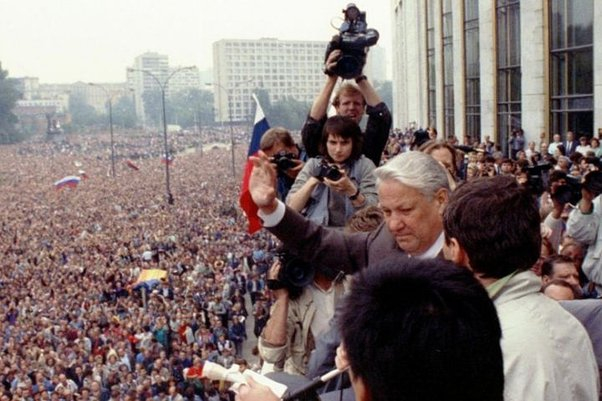
Photo: https://www.quora.com/ 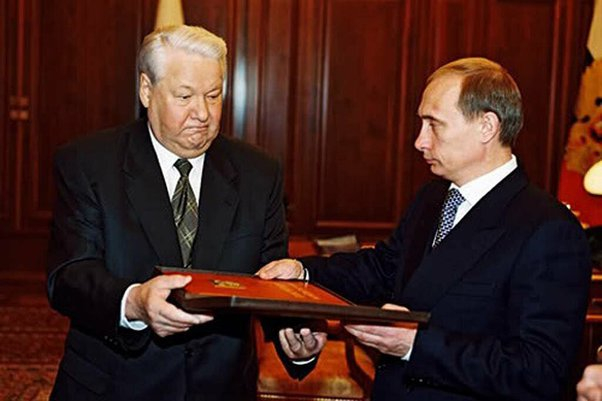
Photo: https://www.quora.com/ -
During his first term as president of the Russian Federation, Yeltsin battled heart illness, which he most likely had for the remainder of his life. Immediately following his election as a member of parliament in March 1990, he is known to have experienced heart issues. Early in 1996, it was well known that he was recovering from a string of heart attacks. Shortly after, he underwent quintuple bypass surgery and spent months in the hospital rehabilitating.
The world press gave Yeltsin's personal and medical issues a considerable deal of coverage. Instead of the inspirational leader he had previously been, he was frequently perceived as becoming more and more inebriated and unstable as time went on.
Following his meeting with U.S. Deputy Secretary of State Strobe Talbott after President Clinton's inauguration in 1993 and an incident during a flight stopover at Shannon Airport, Ireland, in September 1994, when the awaiting Irish Prime Minister, Albert Reynolds, was informed that Yeltsin was ill and would not be leaving the aircraft, Yeltsin's alcoholism was also a topic of media discussion. Bill Clinton alleged that Yeltsin was discovered on Pennsylvania Avenue in his underwear, intoxicated, and trying to hail a taxi cab to get to a pizza shop during a 1995 visit to Washington.
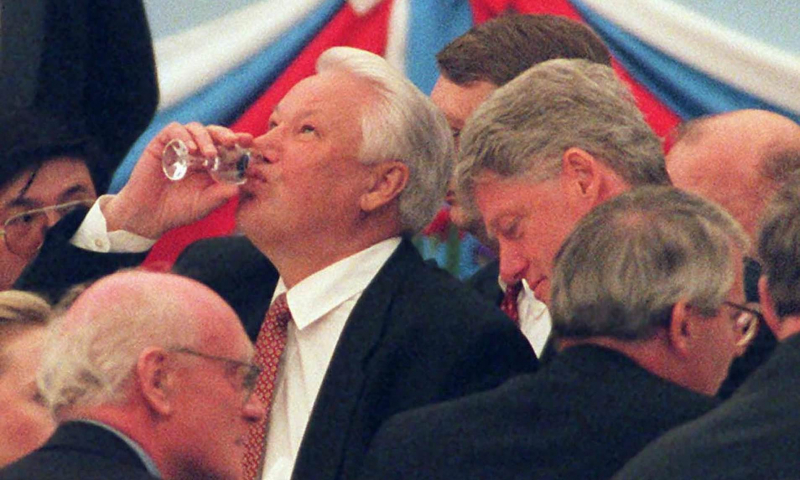
Photo: https://www.dailymail.co.uk/ 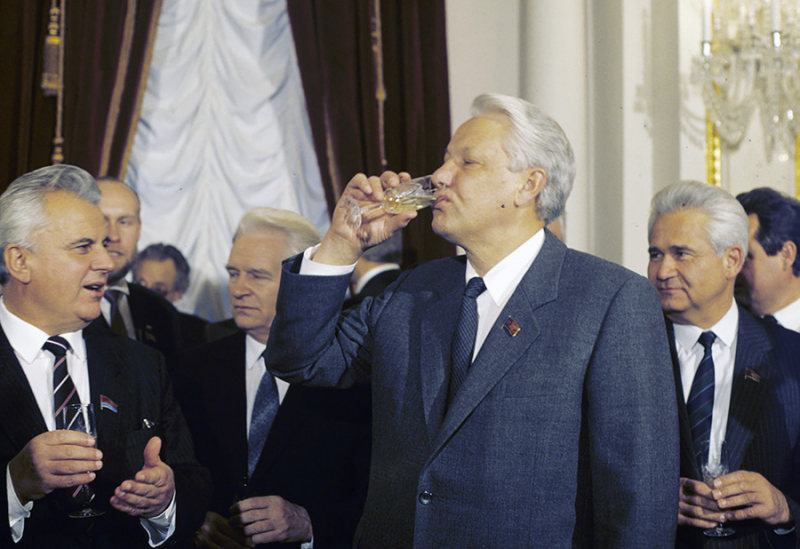
Photo: https://www.quora.com/ -
Yeltsin kept a low profile following his resignation, rarely speaking or appearing in public. In December 2000, he criticized his successor Putin for advocating the use of the Soviet-era national anthem's melody once again. He spent six weeks in the hospital in January 2001 due to pneumonia brought on by a viral infection. Following the Beslan school hostage crisis and nearly simultaneous terrorist attacks in Moscow on September 13, 2004, Vladimir Putin announced a plan to replace the current system of electing regional governors with one in which they would be directly appointed by the president and confirmed by regional legislatures. Yeltsin and Mikhail Gorbachev publicly denounced Putin's plan as moving Russia away from democracy and toward the Soviet-era system of centrally-run politics.
Yeltsin underwent hip surgery in Moscow in September 2005 after breaking his femur in a fall while on vacation in Sardinia, Italy.
Yeltsin, 76, passed away from congestive heart failure on April 23, 2007. On April 25, 2007, his corpse was laid to rest at the Moscow Cathedral of Christ the Saviour before being interred in the Novodevichy Cemetery. Yeltsin was the second Russian head of state—following Emperor Alexander III—to be buried in a church ceremony in 113 years.
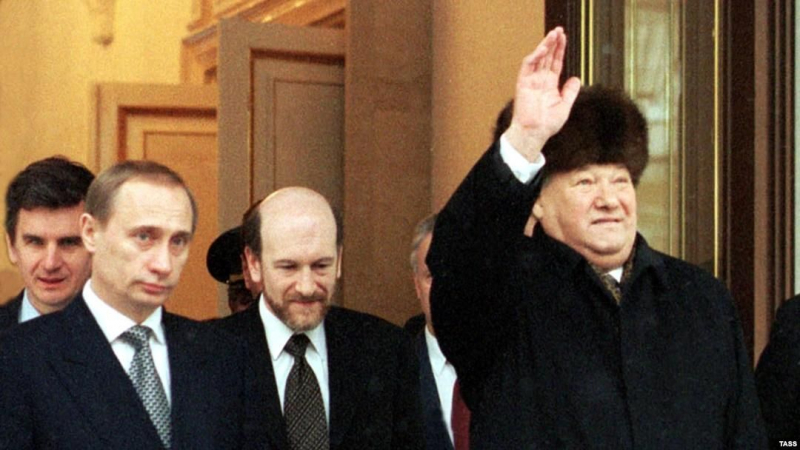
Photo: https://www.rferl.org/ 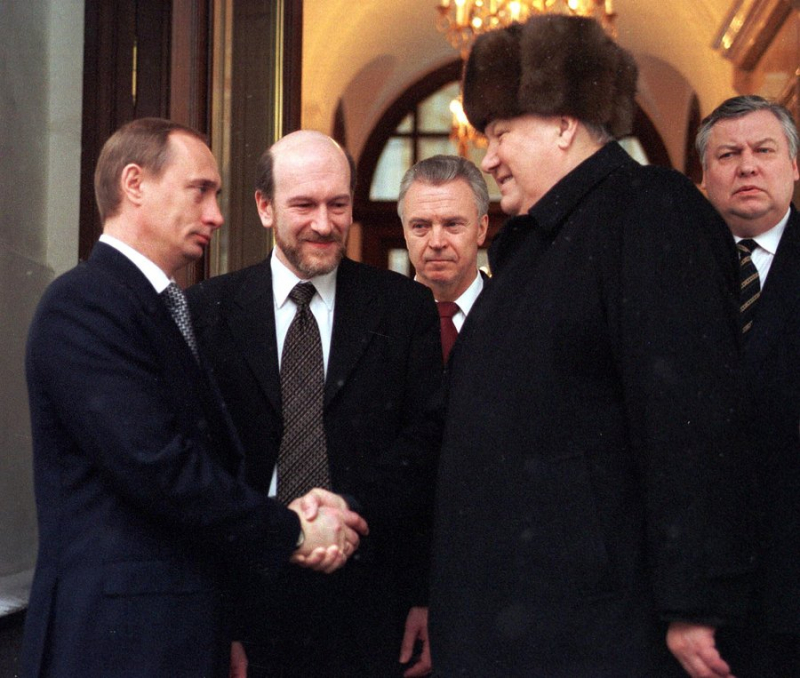
Photo: https://usrussiarelations.org/












